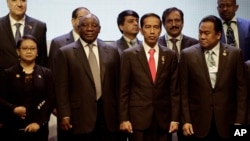On Tuesday the president of Indonesia addressed the business summit at the Asia Africa Conference underway in Jakarta, but after last minute changes to the schedule he was the only head of state who spoke. Generally, Asian and African leaders who had been scheduled to play a high-profile role at the summit may end up as no-shows.
Indonesian President Joko Widodo told the hundreds of business leaders and diplomats from Asia, Africa and the Middle East that economic development is the way to reach the goals of peaceful coexistence, independence and solidarity that were set at the 1955 Bandung Asia Africa Conference.
He said the forum is the place to make a realization of the Bandung spirit through strengthening trade and investment cooperation.
The Indonesian president encouraged governments to take actions to lower trade barriers among developing countries and to make it less risky, less bureaucratic and less costly for international businesses to invest.
And to reinforce a unifying political cause of the conference, Widodo called for an independent Palestinian state, separate from Israel, after he met privately with Palestinian Prime Minister Rami Hamdallah.
He said Palestine was the only country still under “occupation,” and told the Palestinian leader that it’s about time to end it.
List of no-shows
The Indonesian president was supposed to share the stage at the Asia Africa Business Summit with a number of other world leaders but they did not show.
President Xi Jinping of China was scheduled to address the conference and there was an expectation that he would talk about his country’s efforts to establish the Asian Infrastructure Investment Bank to rival U.S.-led development institutions. Instead, he was in Pakistan Tuesday.
Japan’s Prime Minister Shinzo Abe was scheduled to speak and there was speculation that he would address demands from South Korea and China for a meaningful apology for atrocities committed by Japanese soldiers during World War II. He departed Japan for Indonesia on Tuesday, and there is speculation he may still meet with China’s leader on the sidelines of the conference later this week.
Leaders from South Africa, Ethiopia and Pakistan were also scheduled to speak but none showed on Tuesday.
South Africa President Jacob Zuma cancelled his trip to Indonesia to deal with a surge of anti-immigrant violence at home. On Monday, Sudan’s President Omar Hassan al-Bashir, who faces an arrest warrant by the International Criminal Court for war crimes, abruptly cancelled his visit. Authorities in Sudan said he had work related to the country’s recent elections.
Indonesian delegate to the conference Irawati Batangtaris said they were looking forward to hearing from the leaders of these participating countries.
“I’m sure as Indonesians we are a little bit disappointed. But I am sure they are educated and sophisticated enough [to realize] that the top leaders they have also other business meetings to attend,” Batangtaris said.
Other delegates like Ayanda Mngadi with the South Africa Maritime Safety Authority says it is actually better to keep this business summit segment of the conference focused on business.
“I think the conference is still quite well attended and all the business leaders who are here, are supposed to be here. And the presidents who couldn’t turn up are well represented, like for instance our president in South Africa is represented by a deputy president, so it’s quite satisfying,” said Mngadi.
Indonesian Foreign Ministry officials cited unavoidable scheduling conflicts for the changes.
The leaders of China and Japan and some other leaders will still participate in the conference. They are either expected to attend the leaders summit that begins Wednesday or participate on Friday in a historical procession in Bandung that was part of the first conference 60 years ago.





